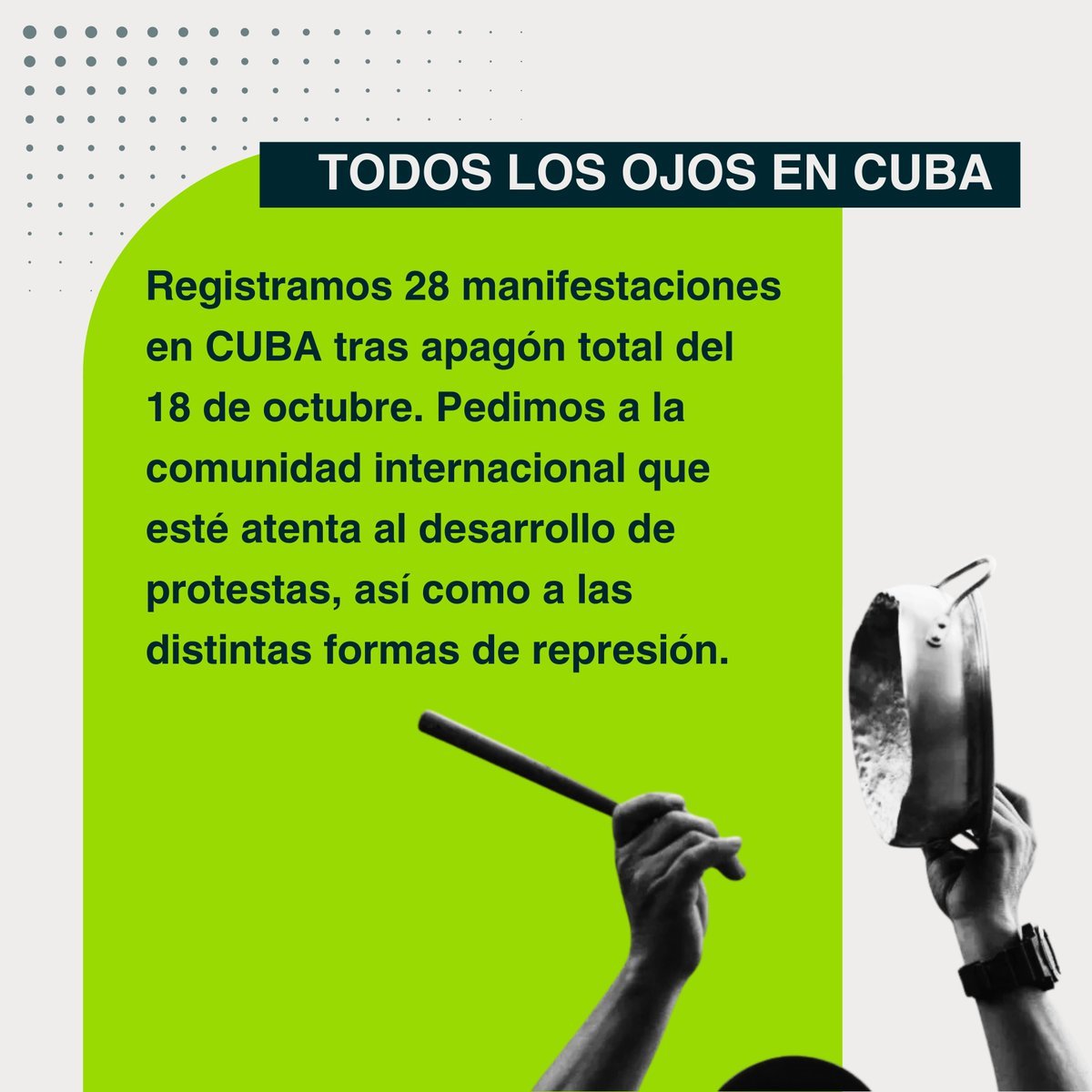Fourth Day of Blackout in Cuba
Video of pot-banging protests in Marianao and Cuatro Caminos in Havana, Cuba. Pot-banging is a popular form of protest in Cuba and other parts of Latin America. Reuters/Martí Noticias.
The NGO Justicia 11J reported in a statement on Monday, October 21. 2024 that in the past three days, since the total blackout last Friday, at least 28 small protests have been recorded in seven provinces, primarily concentrated in Havana.
Fourth Day of Blackout in Cuba: Protests, Díaz-Canel’s Threats, and the Arrival of Hurricane Oscar
Below is a summary based on the independent Cuban news outlet 14ymedio, covering key developments as of October 21, 2024, as Cuba endures its fourth day of a nationwide blackout:
Fourth Day of Blackout in Cuba: Protests, Díaz-Canel’s Threats, and the Arrival of Hurricane Oscar (14ymedio, October 21, 2024).
Havana completely in darkness on Friday, October 18, following the collapse of the National Electric System. (Reuters/Norlys Perez)
English translation. Original in Spanish. See 14yMedio.
Fourth Day of Blackout in Cuba: Protests, Díaz-Canel’s Threats, and the Arrival of Hurricane Oscar
Cuba is enduring its fourth consecutive day of widespread blackouts, sparking public protests and threats from President Miguel Díaz-Canel. Despite efforts by the National Electric Union (UNE) to restore power, much of the country remains in precarious conditions, worsened by the impending Hurricane Oscar.
Some areas, including parts of Havana and Las Tunas, have regained electricity through isolated power systems known as "islands." However, a failure in the central 110kV line on Sunday caused another major blackout after six generating units had been reconnected. The UNE is working to restore power through Energás and regional power islands but progress remains unstable.
The blackouts have disrupted essential services across Cuba. Water treatment plants are non-operational, leaving people to drink untreated water, while garbage accumulates in the streets. State services are selling perishables, such as chicken, before they spoil, but purchases must be made in cash since ATMs and electronic payment systems are down. Hospitals and other essential services are running on generators, but police have disconnected power from nearby circuits to divert electricity exclusively to these facilities.
Amid the crisis, protests have erupted in several cities, including Havana and Trinidad, with people banging pots and pans in defiance of the ongoing power outages. In response, President Díaz-Canel has threatened demonstrators, labeling them as "indecent" and accusing some of acting on the instructions of Cuban counterrevolutionary forces abroad. The government has increased police presence in major cities, especially in Havana, where officers are stationed at key intersections.
The Cuban Minister of Energy and Mines, Vicente de la O Levy, acknowledged the rising tensions and the small protests, referring to participants as "cowards who don’t reason and sell out." He also admitted that the situation within the electrical system is "very tense."
President Díaz-Canel emphasized that the country is facing an "exceptional situation" due to an energy emergency exacerbated by U.S. economic sanctions and the approaching Hurricane Oscar. The government is attempting to stabilize the electrical grid and secure fuel supplies, but no clear solution has been offered for the critical thermal power plants, which are key to resolving the ongoing crisis.
Meanwhile, Hurricane Oscar is slowly moving across eastern Cuba, causing heavy rain, strong winds, and coastal flooding. The storm's weakening has downgraded it to a tropical storm, but its slow movement continues to pose a significant threat, especially in Guantánamo, Santiago de Cuba, Holguín, and Las Tunas, where intense weather conditions are expected to persist.
The government has suspended all non-essential activities and schools until Wednesday, October 23, and assured workers that they will still be paid, regardless of whether they can report to work.
See article in Spanish. Julio Cesar Contreras, State employees are being ordered to confront 'any situation' in the streets due to the blackouts. (14yMedio, Oct 21. 2024)
Summary: In Cienfuegos, workers are being ordered to guard workplaces and prevent protests amid widespread blackouts, but many are conflicted. Some, like Humberto, follow orders out of fear of losing their jobs, while others, like Mayra, refuse, aligning with the protesters' grievances. Guards are organized in 24-hour shifts, with instructions to quickly alert the police if they see suspicious activity. Tensions are high as the population grows increasingly frustrated by the power outages, and fears of violent confrontations rise. Many workers express concerns about the possibility of escalating unrest.



